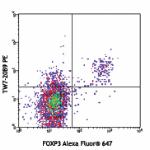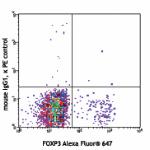- Clone
- TW7-20B9 (See other available formats)
- Regulatory Status
- RUO
- Other Names
- Transforming growth factor-beta 1 (TGF-b1), Latency Associated Peptide (LAP), TGFB1, DPD1, TGF-beta1
- Isotype
- Mouse IgG1, κ
- Ave. Rating
- Submit a Review
- Product Citations
- publications
| Cat # | Size | Price | Save |
|---|---|---|---|
| 141307 | 100 µg | ¥44,820 | |
| 141308 | 1 mg | ¥123,340 |
Transforming growth factor beta (TGF-β) is a cytokine that has critical functions in immune response by regulating Treg and Th17 cells. TGF-β is first synthesized as pro-TGF-β and then it is cleaved by furin proprotein convertase in the Golgi apparatus to produce the dimeric propeptides called latency-associated peptide (LAP) that non-covalently associates with the dimeric mature TGF-β to prevent its activity. This complex can further associate with latent-TGF-β-binding protein (LTBP) to produce a large latent form for deposition onto the extracellular matrix. The latent-TGF-β can be expressed on the membrane of activated Treg cells, immature dendritic cells, megakaryocytes, and platelets.
Product DetailsProduct Details
- Verified Reactivity
- Mouse
- Antibody Type
- Monoclonal
- Host Species
- Mouse
- Immunogen
- Mouse Tgfb1-transduced P3U1 cells
- Formulation
- 0.2 µm filtered in phosphate-buffered solution, pH 7.2, containing no preservative.
- Endotoxin Level
- Less than 0.01 EU/µg of the protein (< 0.001 ng/µg of the protein) as determined by the LAL test.
- Preparation
- The Ultra-LEAF™ (Low Endotoxin, Azide-Free) antibody was purified by affinity chromatography.
- Concentration
- The antibody is bottled at the concentration indicated on the vial, typically between 2 mg/mL and 3 mg/mL. Older lots may have also been bottled at 1 mg/mL. To obtain lot-specific concentration and expiration, please enter the lot number in our Certificate of Analysis online tool.
- Storage & Handling
- The antibody solution should be stored undiluted between 2°C and 8°C. This Ultra-LEAF™ solution contains no preservative; handle under aseptic conditions.
- Application
-
FC - Quality tested
IP, Neut, WB - Reported in the literature, not verified in house - Recommended Usage
-
Each lot of this antibody is quality control tested by immunofluorescent staining with flow cytometric analysis. For flow cytometric staining, the suggested use of this reagent is ≤ 1.0 µg per million cells in 100 µL volume. It is recommended that the reagent be titrated for optimal performance for each application.
- Application Notes
-
Clone TW7-20B9 has been reported to not cross-react with human LAP.2 Several anti-LAP antibody clones have been compared and characterized for their LAP reactivity.2 This antibody recognizes recombinant LAP, latent TGF-ß, and pro-TGF-ß.
Additional reported applications (for relevant formats) include: Western blotting1, immunoprecipitation1, and neutralization2. TW7-20B9 is able to neutralize certain unconventional T cell-derived forms of TGF-ß activity, but not the distinct 25 kDa free form of TGF-ß.2 -
Application References
(PubMed link indicates BioLegend citation) -
- Oida T, et al. 2010. PLoS ONE (FC, IP, WB)
- Oida T, et al. 2011. PLoS ONE 6:e18365. (Neut)
- Tu Z, et al. 2012. Invest Ophthalmol Vis Sci. 53:959. PubMed
- RRID
-
AB_2832509 (BioLegend Cat. No. 141307)
AB_2860693 (BioLegend Cat. No. 141308)
Antigen Details
- Structure
- Dimmers of latency-associated peptide non-covalently associated with dimmers of mature TGF-β
- Distribution
-
Many cell types, highly expressed on activated Tregs and platelets
- Function
- TGF-β controls cell differentiation, tissue morphogenesis, cell growth, inflammation, matrix synthesis, apoptosis, and regulates immune response.
- Ligand/Receptor
- TGF-β receptors
- Cell Type
- Dendritic cells, Platelets, Tregs
- Biology Area
- Apoptosis/Tumor Suppressors/Cell Death, Cell Biology, Immunology, Signal Transduction
- Molecular Family
- Cytokines/Chemokines, Growth Factors
- Antigen References
-
1. Oida T, et al. 2010. PLoS
2. Tran D, et al. 2009. P. Natl. Acad. Sci. USA 106:13445.
3. Ochi H, et al. 2006. Nat. Med. 12:627.
4. Oida T, et al. 2003. J. Immunol. 170:2516.
5. Nakamura K. 2001. J. Exp. Med. 194:629.
6. Miyazono K, et al. 1993. Growth Factors 8:11. - Gene ID
- 21803 View all products for this Gene ID
- UniProt
- View information about LAP on UniProt.org
Related FAQs
- Do you guarantee that your antibodies are totally pathogen free?
-
BioLegend does not test for pathogens in-house aside from the GoInVivo™ product line. However, upon request, this can be tested on a custom basis with an outside, independent laboratory.
- Does BioLegend test each Ultra-LEAF™ antibody by functional assay?
-
No, BioLegend does not test Ultra-LEAF™ antibodies by functional assays unless otherwise indicated. Due to the possible complexities and variations of uses of biofunctional antibodies in different assays and because of the large product portfolio, BioLegend does not currently perform functional assays as a routine QC for the antibodies. However, we do provide references in which the antibodies were used for functional assays and we do perform QC to verify the specificity and quality of the antibody based on our strict specification criteria.
- Does BioLegend test each Ultra-LEAF™ antibody for potential pathogens?
-
No, BioLegend does not test for pathogens in-house unless otherwise indicated. However, we can recommend an outside vendor to perform this testing as needed.
- Have you tested this Ultra-LEAF™ antibody for in vivo or in vitro applications?
-
We don't test our antibodies for in vivo or in vitro applications unless otherwise indicated. Depending on the product, the TDS may describe literature supporting usage of a particular product for bioassay. It may be best to further consult the literature to find clone specific information.
Other Formats
View All LAP Reagents Request Custom Conjugation| Description | Clone | Applications |
|---|---|---|
| Purified anti-mouse LAP (TGF-β1) | TW7-20B9 | FC,IP,WB,Neut |
| PE anti-mouse LAP (TGF-β1) | TW7-20B9 | FC |
| Ultra-LEAF™ Purified anti-mouse LAP (TGF-β1) | TW7-20B9 | FC,IP,Neut,WB |
Compare Data Across All Formats
This data display is provided for general comparisons between formats.
Your actual data may vary due to variations in samples, target cells, instruments and their settings, staining conditions, and other factors.
If you need assistance with selecting the best format contact our expert technical support team.
-
Purified anti-mouse LAP (TGF-β1)

C57BL/6 mouse splenocytes were stimulated with anti-mouse CD... 
-
PE anti-mouse LAP (TGF-β1)

C57BL/6 mouse splenocytes were stimulated with anti-mouse CD... 
-
Ultra-LEAF™ Purified anti-mouse LAP (TGF-β1)








Follow Us